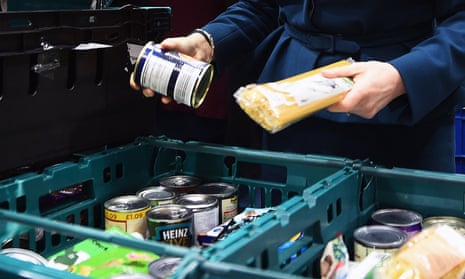Social security payments have hit their lowest level since the launch of the welfare state, excluding millions from mainstream society and fuelling food bank use, according to research.
The £73 standard weekly allowance for universal credit, the government’s flagship benefit claimed by 2.3 million people, is now equivalent to 12.5% of median earnings. By contrast, when unemployment benefit was introduced in 1948 it was worth 20%. As a result, millions are being “excluded from mainstream society, with the basic goods and amenities needed to survive let alone thrive increasingly out of their grip”, the study by the IPPR thinktank said.
The figures come as a senior government adviser said economic insecurity had become “the new normal” and polling showed a third of middle-class voters feared a slump in living standards in the next decade.
Ahead of the election the IPPR is calling on parties to pump an emergency £8.4bn into the system, which has been made tougher than previous regimes by making debt deductions from payments, increasingly underpaying and applying strict sanctions. A third of universal credit claimants are in work.
The Labour leader, Jeremy Corbyn, has already pledged to scrap universal credit, which he branded “inhumane”, and promised a £3bn emergency bailout of the system in the short term.
The Conservative government responded earlier this month by announcing an end to the benefits freeze next April, increasing universal credit payments by 1.7%, in line with inflation, and the state pension by 3.9%.
More than half of people in all social groups think the government should do more “to people to help them become more financially secure”, according to separate polling published on Monday by the Royal Society of Arts (RSA).
Forty per cent of UK adults – equivalent to 21 million people – are not confident of having a decent standard of living in 10 years’ time, compared with 43% who are confident, it found. More than half of voters said concern about poverty and inequality in society would influence their vote.
“Social security should offer a safety net, not a tightrope over poverty,” said Clare McNeil, the associate director of the IPPR. “It is remarkable that in postwar Britain the support for those living in poverty was closer to average earnings than it is today. This is the very simple fact that lies behind the record levels of personal debt, rising use of food banks and increasing destitution that we see in the UK.”
Food bank use has soared, often as a result of people on welfare, including those in work, not being able to afford essentials. Last week, the Trussell Trust said it had distributed a record 823,145 food parcels between April and September, a 23% increase on the previous year and the steepest rise the charity has witnessed since its network of food banks was fully established.
Matthew Taylor, the chief executive of the RSA, who advised the Conservative government on the future of work, will on Monday say that economic insecurity is a new “social evil” that must be tackled and that “lies behind much pessimism and anger as the public prepares to elect a new government”.
In a speech that attacks the assumptions of neoliberalism, including the idea that “all poor people are potential welfare free-riders who need compulsion to be motivated to work”, Taylor will say a “painful gulf” had opened up “between people’s exaggerated sense of personal sovereignty and their bleakly diminished hopes of social progress”.
He will argue political parties should recognise inequality as a “feeling” as much as a fact. He said it was an “unpleasant and often distressing anxiety that we either cannot make ends meet or that we are one setback – loss of work, an unexpected bill, a bout of ill-health – from disaster”.
“Insecurity limits people’s horizons and imaginations, forcing them to focus on the here and now rather than longer term possibilities,” he said.
A spokesperson for the Department for Work and Pensions said: “The government spends more than £95bn each year on working age benefits and universal credit is supporting more than 2.5 million people across the UK.”
